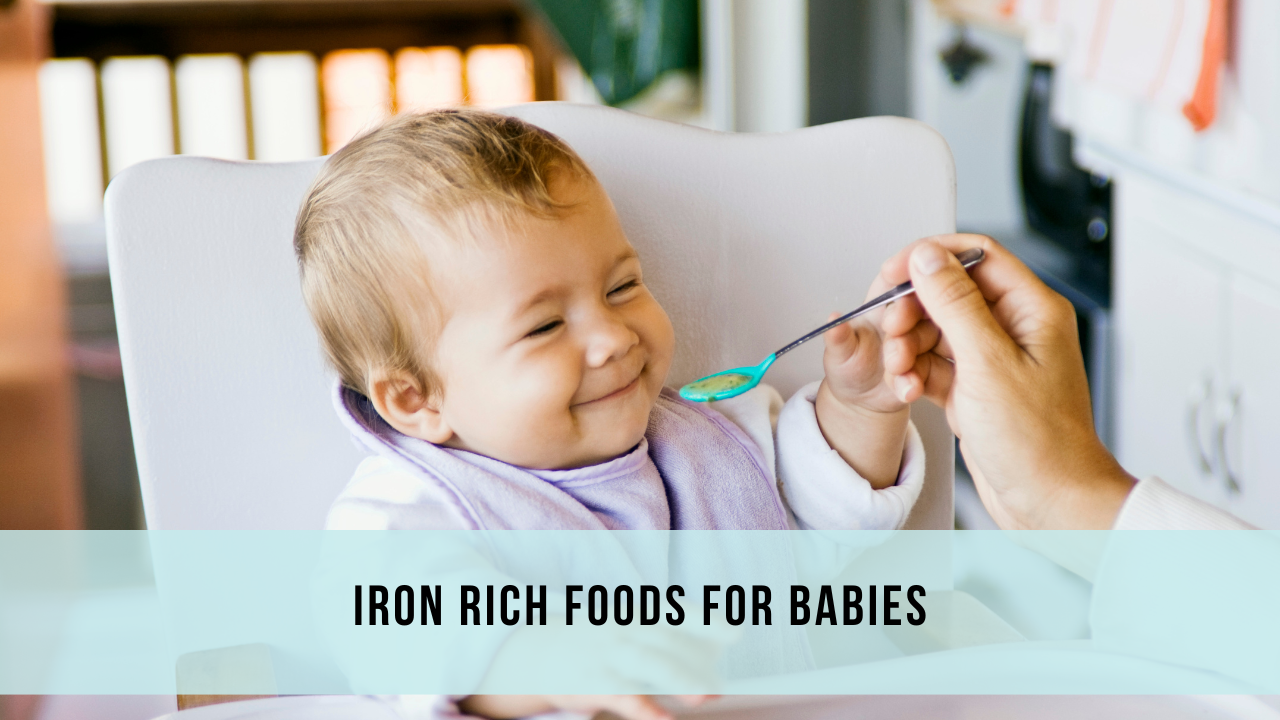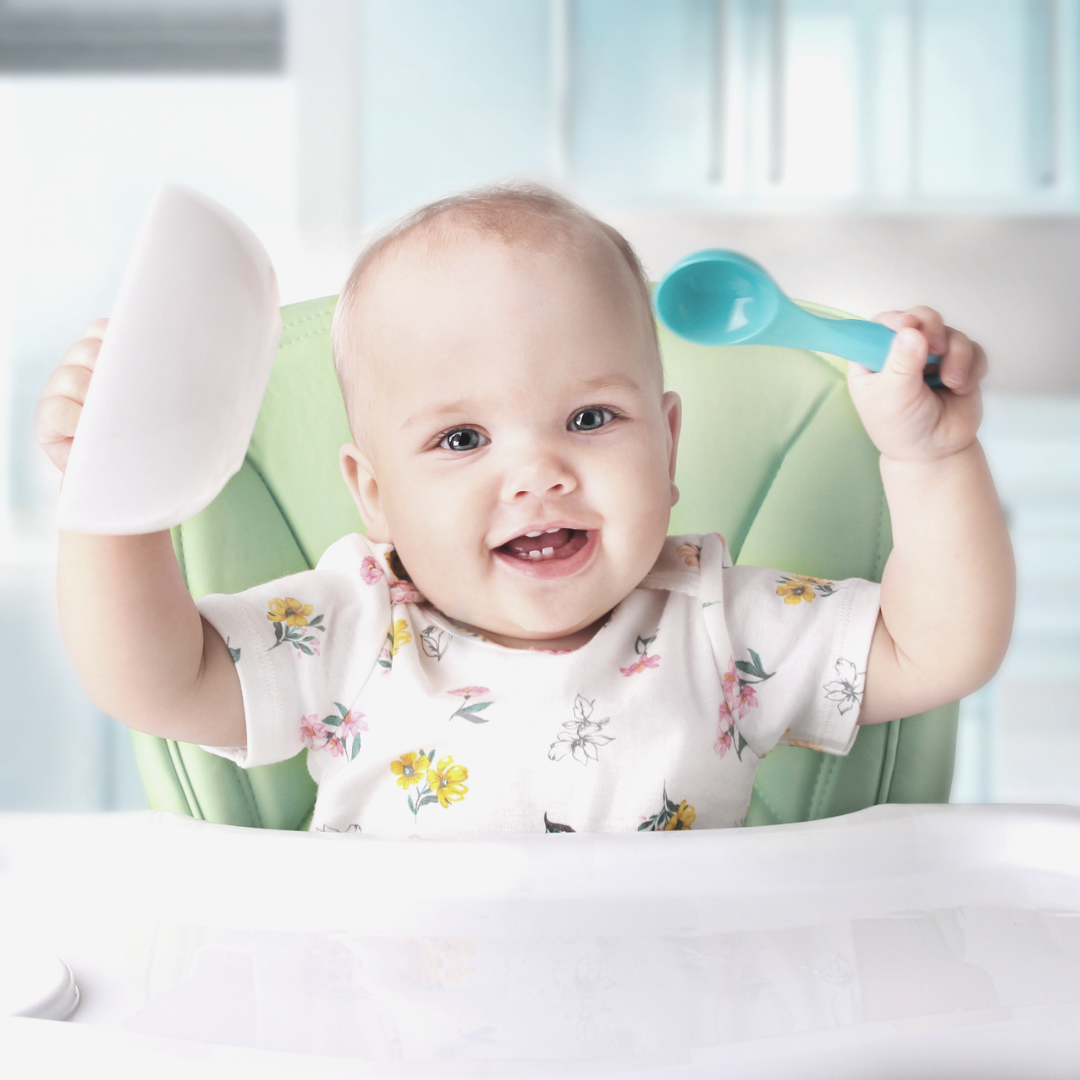Iron Rich Foods for Babies
Mar 13, 2023
Do you know what is one of the most common questions parents ask me?
“We are starting solid foods soon - what is the best food to start with?”
Here’s the great news - you can start with ANY food you want! There is no evidence that starting with something sweet will make your baby only want sweet foods.
In fact, both formula and breastmilk are sweet so your baby is used to that flavor.
One thing I do recommend? Look for foods that are high in iron.
>>> FREE GUIDE: Add FLAVOR and NUTRIENTS to your baby's food. Click here. <<<
What is iron and why are high iron foods important for your baby?
So, what exactly is iron, and why are high-iron foods important for your baby?
Iron is a mineral that plays a crucial role in maintaining healthy blood.
It is essential for making hemoglobin, a protein found in red blood cells that transports oxygen from the lungs throughout the body. This is pretty necessary stuff, right?
But why is it so important for babies?
Well, apart from carrying oxygen from the lungs to other parts of the body, iron is also vital for proper brain or neurological development in infants and children.
As babies experience rapid growth, their bodies will demand more iron to support their development.
Babies acquire iron through three main sources:
-
Circulating Iron Stores from Mom: Babies inherit some iron stores from their mothers that typically last for about four months.
-
Breast Milk: While breastfed babies receive a small amount of iron from breast milk, it's often not sufficient to meet their growing needs.
-
Formula: Formula-fed babies get iron from the formula they consume, but incorporating iron-rich foods into your baby's diet becomes important as they start solids.
It's worth noting that babies, especially those who are exclusively breastfed, are more likely to develop anemia, a condition where the body doesn't have enough healthy red blood cells. Anemic babies may exhibit symptoms such as increased fussiness, weakness, sleepiness, pale skin, and even jaundice.
Iron for babies is so important!
What are iron-rich foods for babies?
There are two types of iron you will find in foods: heme and non-heme iron.
Heme iron foods are commonly found in animal products and are more easily digested:
-
Meat (beef, pork, lamb, goat, venison)
-
Seafood (fatty fish)
-
Poultry (chicken or turkey)
-
Eggs
Non-heme iron foods are more plant-based and a bit harder to digest:
-
Quinoa
-
Lentils
-
Tofu
-
Beans
-
Greens
It is recommended to pair non-heme iron foods with foods rich in Vitamin C to help your baby’s body absorb the iron they need for development such as:
-
Citrus fruits like oranges
-
Berries
-
Papaya
-
Tomatoes
-
Sweet potatoes
-
Broccoli
-
Cabbage
-
Dark green leafy vegetables
Easy iron-rich baby food recipes
-
Sweet potato & lentil puree
-
1 small sweet potato, peeled and diced
-
1/4 cup cooked lentils (well-cooked and mashed)
-
1/4 cup fresh spinach leaves, finely chopped
-
1/2 ripe banana, mashed
-
Instructions:
-
Steam or boil the sweet potato until soft, then mash or puree it.
-
Mix in the cooked and mashed lentils and finely chopped spinach.
-
Stir in the mashed banana for added flavor and creaminess.
-
Ensure the mixture is cool enough for your baby or toddler, then serve.
-
-
-
Iron-rich smoothie for toddlers
-
1/2 cup fresh spinach
-
1/4 cup mixed berries (frozen or fresh)
-
1/2 ripe banana
-
1/4 cup yogurt (plain Greek)
-
1/2 tablespoon chia seeds
-
1/4 cup fresh-squeezed orange juice
-
Instructions:
-
Put spinach, berries, banana, yogurt, chia seeds, and orange juice into a blender.
-
Blend until smooth.
-
Taste, and add more orange juice or water if it's too thick.
-
-
-
Easy bolognese for the whole family
-
1 lb ground beef
-
1/2 cup spinach, finely chopped
-
Low-sodium pasta sauce (or you can make your own if desired)
-
Pasta noodles of choice (bonus if you choose one that is iron-fortified or is made of lentils or chickpeas for added protein and iron)
-
Instructions:
-
Cook pasta noodles in boiling water per instructions.
-
Use a skillet over medium heat to cook through ground beef. Break any large chunks into small pieces.
-
Add spinach after the meat is cooked through.
-
Set aside a portion of meat for your baby.
-
Add pasta sauce and cook until it is warm.
-
Serve over noodles.
-
-
Babies can eat meat with or without sauce (pay attention to the sodium content).
-
Noodles should be cut into small pieces.
-
What if I am using store-bought food?
The best piece of advice I can give is to learn to read the nutritional label to see if it is an iron-rich food for your baby.
Look for baby food with ANY iron content, but be cautious not to rely solely on marketing claims of being "high in iron." It may not be as high as you'd imagine.
Is iron-fortified cereal a good first food for babies?
You only have to serve baby cereal if you want to. There are some benefits and some drawbacks to consider.
Benefits:
-
It is bland and usually well-accepted when it is mixed with either breast milk or formula.
-
You can adjust the texture to make it thicker or thinner based on your baby's development.
-
It is an easy way to get added nutrients like iron. You can easily add food with vitamin C like freshly squeezed orange juice so the body can absorb the iron even better.
Drawbacks:
-
It is often made with rice, which can be constipating and has a higher level of heavy metals.
-
For ways to avoid heavy metals in baby food, read more here
-
It does not encourage flavor variety when it is fed to babies daily.
-
Grandparents often tell you to put it in your baby's bottle to help them sleep better - this is not true.
If you want to introduce baby cereal, choose one that is oatmeal or quinoa-based.
We use Earth's Best oatmeal cereal once every few days, which has protein and fiber!
Does my baby need an iron supplement?
Your pediatric provider will monitor your child’s iron levels at either the 9 or 12-month check-up. It may be necessary to supplement if your provider recommends it.
Let’s be honest though - iron is NOT the tastiest and it can be really hard to get your baby to take it. Your pediatrician may also suggest pairing it with some orange juice to help the iron absorb better.
In my experience, babies may refuse iron supplements, but I see babies do well with novaferrum.
How do I know if my baby is getting enough iron?
It is recommended that all babies get bloodwork to check for anemia at either the 9 or 12-month well check. Some clinics check a hemoglobin level, while others do a complete blood count (CBC). This may be done through a finger-stick or through getting blood from a vein (also known as a venipuncture).
Reach out to your pediatric provider to see how they check.
There are numerous sources of iron to choose from when introducing solid foods to your baby.
Offering a wide variety of foods will help ensure they get the iron they need for healthy development. It does take some effort, but iron for babies is a crucial component for their well-being.
If you ever have concerns about your child's iron levels, don't hesitate to reach out to your pediatric provider for guidance and support.
>>> Want to feel more comfortable feeding your baby solids? Starting Solids 101 is a great place to start to figure out what is right for YOUR baby and family. <<<
*This post may contain affiliate links. If you purchase using my links, I get a small portion of the money which helps me offer you free content.
>>> Tired of worrying about feeding your baby? Get personalized support so you can enjoy feeding your baby. <<<
Free Resource for Parents and Medical Providers:
The Baby Feeding Database
Helping you understand what formulas are available and narrow down what is best for your family.
This will sign you up for the Baby Feeding Coach email list. I will not spam you. Opt out anytime.






